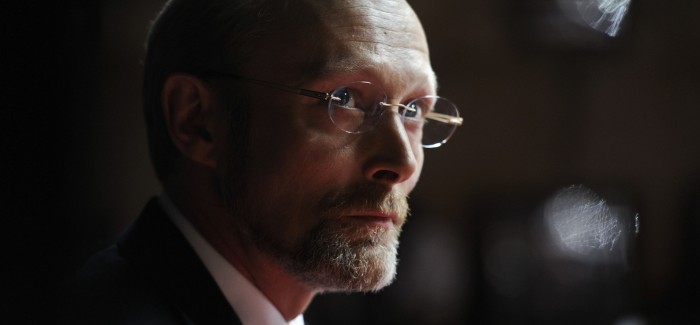Netflix UK TV review: Sherlock Season 3 Episode 3 (His Last Vow)
Review Overview
Sleuthing
8Surprises
8Feelings
10David Farnor | On 13, Jan 2014
Warning: This review contains mild spoilers.
“The problems of your past are your business. The problems of your future are my privilege.”
It’s hard to know exactly how you would react to the news that the woman you’ve just married is actually a former secret service agent hiding under a false name, but it’s safe to say that John Watson’s (Martin Freeman) response to his wife Mary (Amanda Abbington) is as sweet as they come.
An ex-spy masquerading as a blushing bride? Yes, for those wanting more story from Season 3 of Sherlock, His Last Vow certainly gives it to them. And then some. Steven Moffat and Mark Gatiss have spent the last two episodes gradually refocusing the series to follow characters more than crimes. That’s what elevates the BBC’s reboot above programmes such as Jonathan Creek – Sherlock isn’t a detective show, it’s a show about a detective.
All that time spent exploring the sandbox of affections means that when they do kick the plot engine into gear, it carries huge weight; enough weight to turn this season’s climactic battle of wits into a tussle of loyalty and leverage – exactly the currency that professional blackmailer Charles Augustus Magnussen trades in.
Lars Mikkelsen is chilling as the ruthless villain, all blank eyes and grey clothes. Steven Moffat’s script smartly sets him up as technologically endowed genius, with Google Glass-style specs that can pinpoint a person’s weakness with Terminator-like precision. When Nick Hurran’s visual tricks are put to one side, though, the truth is far more unnerving – and leaves Sherlock facing someone he can’t outthink. Compared to Magnussen’s intellect, Sherlock’s “Mind Palace” looks more like a brain gazebo.
It’s the final step in a journey that has humanised the superhuman. Cumberbatch has excelled in the lead for these three chapters, going from sexily-cheekboned cipher to comedy French waiter to, in a bold move from Moffat and Gatiss, full-on morphine junkie. Those cheeks have never looked less chiseled.
It takes Magnussen, though, to push him to the edge of his abilities – not mentally, but emotionally. During the course of the 90 minutes, his mind outmanoeuvres his friends, including brother dear Mycroft (the increasingly show-stealing Mark Gatiss), but it’s the embarrassed admission of sibling sentiment in the garden of their family home that thrills more than the cognitive acrobatics. A relationship with Mary’s bridesmaid Janine, meanwhile, teases the idea that Sherlock might actually be capable of a romantic relationship, but it’s his sincere vow to protect the happy couple that drives Benedict Cumberbatch’s sleuth to uncharacteristic, violent lengths.
Which brings us back to the secret service, erm, secret. Tightly paced and intricately assembled, Moffat’s script repeatedly subverts our expectations, mostly for the benefit of character; the revelation that Mary is a killer to match Sherlock’s sociopath could have led to some kind of dreadful crime-fighting trio, but instead it’s turned into a reflection of John’s unhealthy choice of companions. (Could this whole season actually be taking place inside John’s fractured mind? You could almost believe the writers would do it.)
That’s what makes John’s response to Mary so effective; Martin Freeman, whose mix of outrage, sadness and anger this season has proven there is a masterful art to his everyman shtick, chooses to look forward with a grin and forgive – it’s a move that, one could argue, relegates Mary to merely being defined by John, but the removal of her super-secret sniper skills from the equation keeps her as the smart woman of the first two episodes who can manipulate both Holmes and her husband. The carefully balanced dynamic that made her such an interesting addition to the show (and not simply the jealous wife to their bromance) is retained, while John and Mary’s marriage is also strengthened.
As Mycroft spends his time trying to save his brother, we get a taste of the grey, corrupt modern world in which Sherlock is set. But it’s those subtle relationships between the ensemble, which see Mrs. Hudson and Inspector Lestrade shocked by Sherlock’s drug use – and Molly Hooper furious – that makes Sherlock such a fun mystery to unravel. Not its winding stories or wittily updated context, but its ever-evolving characters.
The final looming prospect of one of them returning, whether for real or not, is perhaps unnecessary, but the thought of Season 4 is an exciting taste of how these characters will continue to grow.
Any problems of the show’s past aren’t our business any more. The problems of its future? They’ll be our privilege to see.
Sherlock is available on Netflix UK, as part of an £9.99 monthly subscription. It is also available on BritBox, as part of a £5.99 monthly subscription.
Where can I buy or rent Sherlock online in the UK?
Photo: BBC/Hartswood Films





















